Day trading is a challenging and often intimidating venture, as evidenced by the fact that a whopping 85% of day traders quit within the first three years. Despite this sobering statistic, we believe that selecting the appropriate tools can make a significant difference in a trader's success.
Choosing a reliable and efficient day trading platform can give traders an edge in the fast-paced and dynamic world of day trading. In this article, we explore some of the best day trading platforms currently available and analyze their features, benefits, and drawbacks to help you make an informed decision when choosing the platform that best suits your needs.
Best US Day Trading Platforms at a Glance
Day Trading Platforms Compared & Reviewed
Best Day Trading Platforms at a Glance
Among the numerous trading platforms available for US traders, we shortlisted the best picks for day trading. Here's a summary of our list of best day trading platforms and the areas in which they shine:
Overall best platform for day trading - eToro
Best day trading platform for forex - IG
Best day trading platform with lowest fees - Fidelity
Best day trading platform for stocks - Webull
Best day trading platform for ETFs - Interactive Brokers
Best day trading platform for cryptocurrencies - Coinbase
Best day platform for high volume trading - TradeStation
Best day trading platform with no minimum investment – E*Trade
Best day trading platform for advanced investors - Charles Schwab
Best day trading platform for beginners - Robinhood
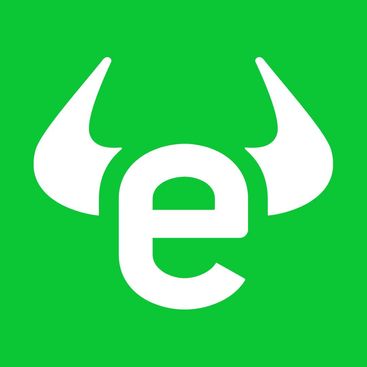
Given its no-commission fee policy and transparent pricing, eToro is our pick for the best overall day trading platform. Besides low-cost trading, its trademark CopyTrade feature along with other social trading functionalities like social feeds allow users to follow and study other day traders’ patterns and automatically copy the portfolios of successful traders.
eToro also features a very straightforward and intuitive outlay – its web workstation offers industry-grade charting capabilities, and mobile apps carry almost every functionality, lacking only some of the charting features, so traders get an all-around experience on all their devices.
Pros
- There's no commission for stock and ETF trading.
- Its social and copy trading features are unparalleled.
- There's a wide range of product portfolio.
Cons
- It's not available in all states.
- There is a number of non-trading fees.
IG is one of the few traders that allow forex trading for US-based investors. The platform also combines an award-winning web-based workstation with tight spreads and overall low-cost services. It also supports a highly-rated mobile app, allowing day traders to access their portfolios and place trades while on the move.
Furthermore, the clear and fast charts provide deep analysis with the ProRealTime tool, helping identify day trading opportunities by helping with research before making the trade. Traders with all experience levels will also appreciate the 24-hour friendly and expert customer support, available through various channels including via phone and email.
Pros
- The educational resources are extensive.
- FX spreads are very tight and the pricing structure is straightforward.
- It follows the best execution practices.
Cons
- It's only possible to trade foreign currencies, other products are restricted to US traders.
- US traders can't use guaranteed stop-loss orders.
- The accounts of US traders are not protected.
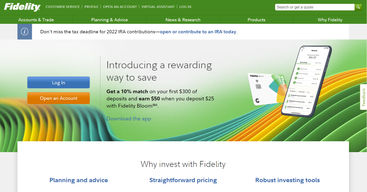
Fidelity is our top pick for the lowest fees because the platform offers $0 commission on US stock trades, ranking among the most competitively priced platforms in the industry. There are also no extra costs for features like bill payments, stop payments, and transferring funds in and out of the account. The platform combines low-cost services with industry-leading research tools and calculators that help plan, evaluate, and track finances.
Additionally, Fidelity offers excellent customer service with 24/7 live chat, email, and phone support. 200 local branches are available for customers that want to speak with customer support in person. The broker is regulated by US government-appointed organizations and has excellent customer reviews.
Pros
- There's a wide range of research providers.
- There's no commission for stock, ETF, and options trades.
- The customer service is excellent.
Cons
- The product portfolio is limited; no access to futures or cryptocurrencies.
- The broker-assist fees are steep.
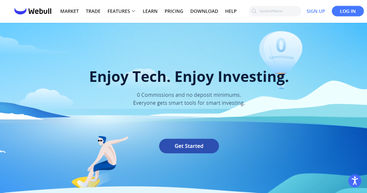
Webull has a far-reaching stock catalogue and maintains a no-commissions structure for stock trading. Also, when a new account is funded $100, traders receive 12 free fractional shares as a welcome bonus.
Webull offers advanced trading tools for traders to research the market and find the best day trading stock opportunities. The tools are included in the website, tablet app, and mobile app, so traders can switch between devices seamlessly. The platform also supports various order types, from simple orders like stop-limit orders and Trailing Stop orders, to group orders like Stop-Loss/Take-Profit orders, and One-Cancels-the-Other orders.
Pros
- There are no commissions charged for stock, ETF, options, or cryptocurrency trading.
- It's possible to trade fractional shares.
- The stock collection is extensive.
Cons
- The portfolio management tools are limited.
- The product portfolio doesn't include forex or futures.
- The platform employs payment for order flow, which may result in poorer order execution.
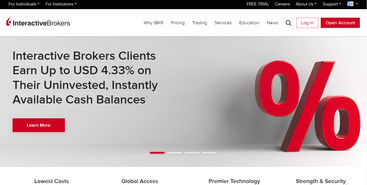
Interactive Brokers are a great choice for ETFs with exposure to over 1000 ETFs along with a no-commission structure, allowing day traders to explore numerous opportunities and save on transaction charges.
IBKR is also regarded highly for its research and analysis amenities – its tools are ideal for day traders interested in deep-diving into the data before formulating a trading strategy. It's worth noting that the sheer number of moving parts can be overwhelming for novice traders, whereas advanced traders will appreciate the quantity and quality of its capabilities.
Interactive Brokers LLC is regulated by the CFTC and SEC and has an almost impeccable industry reputation. Interactive Brokers has excellent customer reviews on websites like TrustPilot, suggesting users have a great experience while using the platform.
Pros
- The platform offers superior order execution with IB Smart Routing.
- The commissions and margin rates are low.
- There's a wide range of advanced trading tools.
Cons
- SmartRouting is not available for Lite users.
- The platform can be confusing and hard to navigate for new starters.
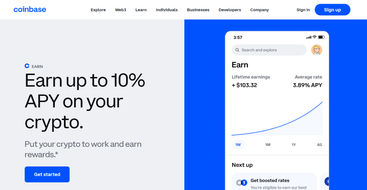
Coinbase has one of the largest cryptocurrency offerings in the industry with exposure to over 3,000 coins. Day traders have more trading options compared to other cryptocurrency exchanges.
The outfit has the appropriate license in every state to ensure they comply with local laws other than Hawaii, making its reach far greater in comparison to its competitors. USD accounts are also insured for up to $250,000, which should give customers peace of mind when holding funds on the exchange. Additionally, customers can take advantage of the Coinbase Learn portion of the website to advance their knowledge of cryptocurrencies. Users can learn the basics and find the latest news on coins of interest.
Crypto.com is one of Coinbase's closest competitors and may be more suitable for some day traders — make sure to read through our comparison before making any decisions.
Pros
- There's a wide selection of cryptocurrencies to trade.
- The platform is very easy to use, and come with no learning curve.
- There is a range of opportunities to earn cryptocurrencies.
Cons
- The pricing structure can be difficult to understand.
- The non-trading fees are steep.
- The customer service is poor.
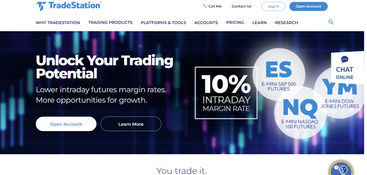
With a combination of a smooth trading mechanism and top-notch execution speed and quality, Tradestation is an excellent choice for high-volume trading. Its UI is also fairly customizable, allowing advanced traders to create an optimized trading environment suited to their preferences. Furthermore, the variety of trading instruments renders the platform appealing for all-around investors who are looking to combine their trades in a single platform.
The platform is regulated by FINRA and NFA and has over 30 years of experience under its belt. As one of the household names in trading, it’s highly trusted by high-net-worth traders and professional investors.
Pros
- The platform supports fast, reliable order execution.
- The fees are very competitive for high-volume traders.
- There are robust automation tools.
Cons
- The platform comes with a steep learning curve.
- The customer support can be difficult to reach.
E*Trade does not have an account minimum investment requirements, so investors can get started with as little as they want. The platform is also fairly transparent about the fees, allowing day traders to anticipate the costs of using the platform.
Of the platform’s two versions, Power E*Trade is more geared towards day traders as it's packed with advanced charting features with technical analysis tools, probability features for options trading, advanced intraday, historical charting capabilities, and versatile risk management features.
Pros
- The platform is very easy to use and feature-rich.
- There are no commissions for trading stocks, ETFs, and options.
- There's a wealth of educational resources.
Cons
- The exposure to foreign markets is limited.
- The margin rates can be high for industry standards.
Charles Schwab is a top-tier day trading platform for advanced investors with its extensive research tools that allow traders to complete deep research dives. Also, Charles Schwab provides an in-house equity rating that helps users screen stocks.
Government-appointed organizations regulate the platform to ensure customer funds are safe. Also, Charles Schwab provides transparent pricing and competitive costs. For an extra fee, the platform offers advanced help that allows users to improve their investment portfolio quality.
Pros
- The research tools are excellent.
- There are robust automation tools.
- There are no commissions to trade stocks and ETFs.
Cons
- The margin rates are high for industry standards.
- The exposure to foreign market is limited.

Robinhood is an excellent choice for beginners because the platform is easy to use, with one of the best user interfaces in the industry. Therefore, new customers can learn how to trade and use the features without a steep learning curve. Also, beginners will enjoy commission-free trades, which makes profiting easier compared to trading platforms with high fees.
Furthermore, Robinhood is regulated by SEC and FINRA, and client assets are insured against cybersecurity breaches. It means beginners can deposit money into Robinhood without fear of losses.
Pros
- The platform is very intuitive and comes with no learning curve.
- There are no trading fees or commissions.
- The account opening process is very fast and fully digitized.
Cons
- The product portfolio is limited.
- The market research tools have room for improvement.
What is Day Trading?
Day trading is the act of buying and selling securities within the same day in an attempt to exploit price movements during a single session. The process involves placing multiple trades in small windows in the hopes of obtaining small but frequent returns. However, day trading is risky and can also lead to losses.
The most common types of day-traded securities include stocks and currencies. Volatile securities are usually the most popular stock picks for day trading as the frequent price swings create more opportunities to turn a profit (though this also means more opportunities to make a loss).
Most day traders are well-versed in the technicalities of trading and have a large pool of funds to invest. Also, many day traders use leverage to increase the size of their investments, which adds another layer of risk while pumping up potential returns.
Traders formulate strategies by paying attention to the news and predicting how the markets will shift. Other traders use sophisticated algorithms combined with high-frequency trading to exploit short-term market inefficiencies.
Day trading can turn out to be very profitable, but for a select few
Besides the seasoned traders and those who day trade for a living, usually employed by hedge funds or other financial institutions, day trading is attractive to many novice investors mostly due to quick returns. Day traders deal with very small windows, as tiny as minutes or hours, to place trades. This means that their goals are short-termed, and they may have all realized within hours.
As positions tend to stay open for small windows, day trading also eliminates the overnight/weekend risk exposure. High-volume traders can also access higher leverages and lowered trading fees.
Yet, very few can actually close the shop, having achieved all or most of their objectives. Studies show that a whopping 97% of day traders lose money over time, while only 1% are profitable. That is because it is simply too difficult, especially for retail traders. Those who day trade for a living have the luxury of a large pool of capital, expensive analytical software, and the right technical expertise.
Dealing with highly volatile securities that day traders normally take advantage of requires in-depth technical analysis skills, market acumen, and incredible emotional resilience to keep their heads cool during the most stressful moments – which leaves a very limited pool of people who can power through. Many amateur traders jump into day trading without understanding the risks involved and the commitment required, and their losses pile up quite quickly.
How much money do you need to start day trading?
The majority of day traders are considered pattern traders. Pattern day traders (PDT) is a regulatory term used to describe traders that execute 4+ day trades over 5 business days. Also, the day trade volume must be greater than 6% of the margin account’s total trade activity within that window. Once this criterion is met, the trading account is designated as PDT by the broker and the minimum $25,000 requirements kicks in. However, if the account minimum drops below $25,000, day trading activity must be stopped until the balance is increased above the threshold.
Although the legal minimum for day trading is $25,000 as mandated by the Financial Industry Regulatory Authority (FINRA), some experts recommend starting with $30,000 or more to improve the profit potential of day trading.
Picking a Good Broker for Day Trading
The choice of a broker is crucial for day traders – it can make or break the whole experience. We have considered the following factors when curating our list of the best trading platformsfor day trading.
Regulation and safety
Regulatory bodies ensure that brokers abide by fair financial practices, and they help protect clients from foul play. Overall, regulators help promote trust between clients and brokers and help reduce the chances of money being stolen.
In the United States, the noteworthy regulators include the Commodities and Futures Trading Commission (CFTC), the Financial Industry Regulatory Authority (FINRA), the National Futures Association (NFA), the US Securities and Exchanges Commission (U.S. SEC), the Chicago Board of Trade (CBOT), and Securities Investor Protection Corporation (SIPC).
Platform stability and reliability
Day traders rely on speed and fully functioning features to profit from trades. A few milliseconds delay could be the difference between a profitable and losing trade. Therefore, the platform’s execution speed is important to reduce the impact of slippage. Also, the live streaming of trade-related data should be fast, allowing day traders to access the most up-to-date information when executing trades.
Mobile and desktop apps should also provide a bug-free and reliable experience. For example, it would be disastrous if a day trader couldn’t buy or sell securities at the end of the session because of technical problems.
Usability
The platform must provide a good overall experience, including an optimized user interface that allows each feature to be quickly found and used. Therefore, novice day traders can begin executing trades without a long learning curve.
Research and analysis tools
Day traders rely heavily on research and analysis tools to make informed decisions. Some of the top features of these tools include:
Deep-dive Research Articles: These are articles related to the asset in question, providing possible insight into whether the price will go up or down.
Market Data: This feature is a stream of trending market data, crowdsourced debates, news feeds, and more.
Recommendations: Some research and analysis tools provide recommendations that traders can apply without doing background research.
Customer support
Day traders need customer support to overcome technical issues. For example, a glitchy platform could cause a big delay between when the trade order was placed and the execution. This could lead to massive slippage, so day traders should seek help to ensure technical problems are solved before continuing.
Ideally, the customer support team should be available 24/7 through multiple communication channels, including live chat, phone, and email.
Trading fees
Now let’s take a closer look at the trading fees that day traders should know to better calculate profitability;
Commission: This is the trading fee, and it’s typically charged as a percentage of the day trade amount. However, many trading platforms offer commission-free trades.
Deposit Fee: This fee is charged when funding the day trading account and varies based on the deposit method.
Withdrawal Fee: Some day trading platforms charge a fee for transferring funds off the platform, and it varies based on the withdrawal method.
Commissions are the most significant fee that brokers deal with, but they can be avoided by using commission-free platforms like Robinhood and Webull (incidentally, we compared the two discount brokerages, Robinhood and Webull - if you're deliberating about either, make sure to visit our review). The savings are massive and increase the profitability of day trading.
However, commission-free brokers may result in slower execution times, which is not ideal for direct access brokers that rely on a speed-of-execution strategy.
Is Day Trading Worth it?
Day trading could be a viable venture to generate profit when using a solid strategy with enough capital to absorb financial setbacks. It’s a possible choice for traders who enjoy a faster form of trading willing to put in the work. It’s time-consuming because research and data crunching is required to spot good trades. Also, trades require a lot of micromanaging daily compared with long-term trading.
Also, there are several day trading strategies, which include algorithmic day trading. This variety of trading strategies allows day traders to find a method that matches their preferences. However, only 1% of day traders consistently turn a profit – so, it’s crucial for novice day traders to set realistic expectations.

















.jpg)



